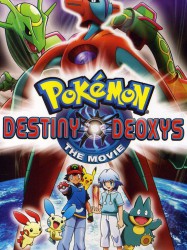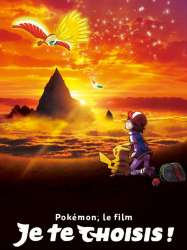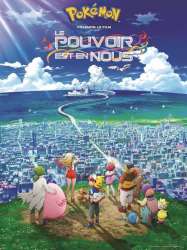Pokémon : Arceus et le Joyau de Vie est un film de genre Fantasy réalisé par Kunihiko Yuyama avec Rica Matsumoto
Pokémon : Arceus et le Joyau de Vie (2009)

Si vous aimez ce film, faites-le savoir !
- Infos
- Casting
- Infos techniques
- Photos
- Vidéos
- Passages TV
- Citations
- Personnages
- Musique
- Récompenses
Durée 1h34
Réalisé par Kunihiko Yuyama
Themes Informatique, Jeu, Voyage dans le temps, Jeu vidéo, Adaptation d'un jeu vidéo, Films pour enfants
Note63%










Pokémon: Arceus and the Jewel of Life, originally released in Japan as Pocket Monsters Diamond & Pearl the Movie: Arceus: To Conquering Space-Time (劇場版ポケットモンスター ダイヤモンド&パール アルセウス 超克の時空へ, Gekijōban Poketto Monsutā Daiyamondo ando Pāru: Aruseusu Chōkoku no Jikū e), is a 2009 Japanese anime film directed by Kunihiko Yuyama. It is the twelfth Pokémon film and the third in the Diamond & Pearl trilogy. This film so far has earned US$50.2 million in Japan, making it the highest grossing animated film of the year in that country, beating Evangelion: 2.0 You Can (Not) Advance and Detective Conan: The Raven Chaser. The English language dub was aired on November 6, 2009, in Australia, November 20, 2009, in the United States on Cartoon Network, on May 28, 2010, in the United Kingdom on Disney XD UK and The Spanish language dub was aired on Spain April 4, 2010, on Disney XD and Latin America on November 21, 2010, on Cartoon Network. This marks the first time that a Pokémon feature film has made its U.S. debut in the same year as its original Japanese release before the Japanese DVD release on December 18, 2009. The theme song of the film is "Kokoro no Antenna" by Shoko Nakagawa. Cartoon Network (Pakistan) aired the movie in August 2011.
The movie's fictitious setting is based on various locations in Greece, which the director and producers visited during August 2008. Among the locations they visited and have been used as inspiration for the movie were the Acropolis, Mycenae, Delphi, Metéora.
The DVD was released on Monday 28 November 2011 in the UK by Universal, as the third Pokémon DVD to come out in the UK since The Rise of Darkrai.
Synopsis
Ce film met en avant pour la première fois à l'écran le Pokémon légendaire Arceus, qui serait à l'origine du monde. Nos 3 héros arrivent dans la région de Michina et s'arrêtent pour faire une pause dans la rivière en se baignant. Des pastèques apparaissaient, alors que Aurore et Sacha tentaient de les prendre, deux dresseurs arrivaient et leurs confirmait que les pastèques leurs appartiennent mais qui ont été égarées par le courant de l'eau.Acteurs

Rica Matsumoto
(Satoshi (voice))

Megumi Toyoguchi
(Hikari (voice))

Yūji Ueda

Shin-ichiro Miki
(Kojiro (voice))

Etsuko Kozakura
(Pochama (voice))
Commentaires
Postez un commentaire :
Suggestions de films similaires à Pokémon : Arceus et le Joyau de Vie
Il y a 95 films ayant les mêmes acteurs, 21 films avec le même réalisateur, 17123 ayant les mêmes genres cinématographiques (dont 633 ayant exactement les mêmes 3 genres que Pokémon : Arceus et le Joyau de Vie), 6165 films qui ont les mêmes thèmes (dont 2 films qui ont les mêmes 6 thèmes que Pokémon : Arceus et le Joyau de Vie), pour avoir au final 70 suggestions de films similaires.Si vous avez aimé Pokémon : Arceus et le Joyau de Vie, vous aimerez sûrement les films similaires suivants :
 , 1h35
, 1h35Réalisé par Kunihiko Yuyama
Genres Fantasy, Aventure, Animation
Thèmes Informatique, Jeu, Jeu vidéo, Adaptation d'un jeu vidéo, Films pour enfants
Acteurs Rica Matsumoto, Megumi Toyoguchi, Takanori Jinnai, Kōichi Yamadera, Yūji Ueda, Natsuki Katō
Note61%





L’intrigue met en scène Celebi, qui revient du futur pour tenter d’empêcher l'affrontement entre les légendaires Pokémon Raiku, Entei et Suicune. Pendant ce temps, Sasha, Pierre et Aurore se dirigent vers la ville de La Couronne pour assister à la compétition mondiale de cuisine. Ils rencontrent alors Zorua, un Pokémon à la recherche de sa maman lorsque la ville se fait attaquer…
 , 1h21
, 1h21Réalisé par Kunihiko Yuyama
Origine Etats-Unis
Genres Science-fiction, Fantasy, Aventure, Animation
Thèmes L'environnement, Informatique, Jeu, Voyage dans le temps, Jeu vidéo, Adaptation d'un jeu vidéo, Films pour enfants
Acteurs Veronica Taylor, Rica Matsumoto, Ikue Ōtani, Rachael Lillis, Mayumi Iizuka, Keiko Toda
Note58%





Sacha, Pikachu et leurs amis traversent une forêt en se rendant à la Ligue Johto. Ils découvrent un jeune garçon inconscient et un mystérieux Pokémon légendaire, Célébi, qui a le pouvoir de voyager à travers le temps ! Mais au cours de leur voyage dans le temps, ils ont été poursuivis par un des plus grands officiers de la Team Rocket, accompagné d'un puissant Mécha...
 , 1h36
, 1h36Réalisé par Tom Wayland, Kunihiko Yuyama
Genres Science-fiction, Fantasy, Action, Aventure, Animation
Thèmes Informatique, Jeu, Jeu vidéo, Adaptation d'un jeu vidéo, Films pour enfants
Acteurs Sarah Natochenny, Emily Bauer, Ikue Ōtani, Bill Rogers, Rica Matsumoto, Yūji Ueda
Note60%





Le Monde inverse est un monde contrôlé par Giratina. Le combat qui avait opposé Dialga et Palkia a créé une fissure. Giratina décide alors de se venger sur Dialga. Et comme d'habitude Sacha, Pikachu et leurs amis sont de la partie.
 , 1h21
, 1h21Réalisé par Eric Stuart, Kunihiko Yuyama
Genres Science-fiction, Fantasy, Action, Aventure, Animation
Thèmes Informatique, Jeu, Jeu vidéo, Adaptation d'un jeu vidéo, Films pour enfants
Acteurs Rica Matsumoto, Veronica Taylor, KAORI, Ikue Ōtani, Fushigi Yamada, Eric Stuart
Note57%





Tous les mille ans, une comète passe près de la terre pendant une période de sept jours. C'est durant cette période que le Pokémon souhait Jirachi sort de son sommeil.

Les Héros Pokémon (2002)
, 1h11Réalisé par Kunihiko Yuyama
Genres Science-fiction, Fantasy, Action, Aventure, Animation
Thèmes Informatique, Jeu, Jeu vidéo, Adaptation d'un jeu vidéo, Films pour enfants
Acteurs Rica Matsumoto, Mayumi Iizuka, Yūji Ueda, Megumi Hayashibara, Shin-ichiro Miki, Fumiko Orikasa
Note61%





Sacha, Pikachu et leurs amis Pokémon tentent de mettre fin aux agissements de deux bandits qui se cachent à Alto Mare, une ville constituée d'eau. Se joignent à l'aventure deux nouveaux Pokémon, un frère et une sœur se nommant Latios et Latias.
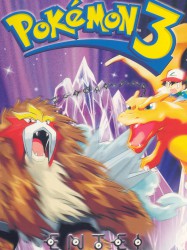 , 1h31
, 1h31Réalisé par Kunihiko Yuyama
Genres Science-fiction, Fantasy, Action, Aventure, Animation
Thèmes Informatique, Jeu, Jeu vidéo, Adaptation d'un jeu vidéo, Films pour enfants
Acteurs Rica Matsumoto, Mayumi Iizuka, Yūji Ueda, Ikue Ōtani, Megumi Hayashibara, Shin-ichiro Miki
Note58%





Le père d'une fillette disparaît mystérieusement lors de fouilles archéologiques. En jouant avec les fouilles, la fillette libère les Zarbi. Ils lui redonnent un père (Entei) et transforment sa maison en cristal. Entei décide d'enlever la mère de Sacha, celui-ci par à son secours.
 , 1h30
, 1h30Réalisé par Tom Wayland, Kunihiko Yuyama
Genres Drame, Science-fiction, Comédie, Fantasy, Action, Aventure, Animation
Thèmes Informatique, Jeu, Jeu vidéo, Adaptation d'un jeu vidéo, Films pour enfants
Acteurs Sarah Natochenny, Emily Bauer, Bill Rogers, Rica Matsumoto, Ikue Ōtani, Megumi Toyoguchi
Note64%





Sacha et Pikachu s'apprêtent à vivre le plus grand combat Pokémon de tous les temps. Palkia et Dialga s'affrontent, créant de terribles dégâts et le mystérieux Darkrai rode.
 , 1h35
, 1h35Réalisé par Kunihiko Yuyama
Genres Drame, Fantasy, Aventure, Animation
Thèmes Informatique, Jeu, Jeu vidéo, Adaptation d'un jeu vidéo, Films pour enfants
Acteurs Jason Anthony Griffith, Rica Matsumoto, Aoi Yūki, Mamoru Miyano, Michele Knotz, Nana Mizuki /
Note57%





La légende raconte qu'autrefois existait un Pokmon unique divin. Mais un jour, il s'est divisé alors que deux jumeaux se faisaient la guerre. Le premier avait soif de réalité, le deuxième, soif d'idéal. L'un avait dans son camp Zekrom, le Pokémon Noir Idéal, l'autre, Reshiram, le Pokémon Blanc Réalité. Depuis longtemps demeuraient deux légendes à propos de la création d'Unys, mais chacune d'elles se complétaient Sacha, Iris et Rachid arrive à Eindoak, endroit où se trouve un château à présent en ruine que l'on nomme "L'épée de la Terre". Nos héros participeront au festivité de la ville. Par la suite, ils rencontreront un Pokémon, Victini, lequel possède un pouvoir qui peut agir sur les humains et les Pokémon. Ce même jour, Dread Grangil, un descendant du royaume, essaye de réaliser les désires du royaume en s'emparant des pouvoir de Victini, ce qui causera aussi la perte d'Eindoak. Tout ceci était sans compter l'arrivée de Reshiram et Zekrom.
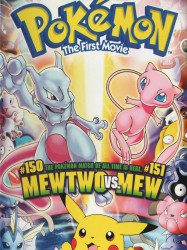 , 1h15
, 1h15Réalisé par Kunihiko Yuyama
Origine Japon
Genres Fantasy, Action, Aventure, Animation
Thèmes Informatique, Jeu, Jeu vidéo, Adaptation d'un jeu vidéo, Films pour enfants
Acteurs Rica Matsumoto, Aurélien Ringelheim, Ikue Ōtani, Rikako Aikawa, Unshō Ishizuka, Mayumi Iizuka
Note63%





L'histoire reprend les personnages originaux du dessin animé avec une nouvelle intrigue, située entre les épisodes 63 et 64 de la saison 1 de la série télévisée.
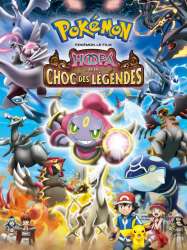 , 1h13
, 1h13Réalisé par Kunihiko Yuyama
Genres Fantasy, Action, Aventure, Animation
Thèmes Informatique, Jeu, Jeu vidéo, Adaptation d'un jeu vidéo, Films pour enfants
Acteurs Rica Matsumoto, Yūki Kaji, Mariya Ise, Mayuki Makiguchi, Megumi Hayashibara, Shin-ichiro Miki
Note59%





Dans une ville déserte au bord de mer, Sacha, Pikachu et leurs amis rencontrent Hoopa, le Pokémon fabuleux qui a le talent de faire apparaître des personnes et des Pokémon grâce à ses anneaux magiques. Suite à un incident effrayant, une histoire ancienne leur apprend que les méfaits d'un Pokémon terrifiant ont été arrêtés il y a bien longtemps par un héros courageux. La menace, enfouie pendant de nombreuses années, est désormais prête à se déchaîner à nouveau ! Sacha peut-il aider son nouvel ami à surmonter son côté obscur... ou un secret dangereux va-t-il se transformer en un choc de légendes ?
 Connexion
Connexion


